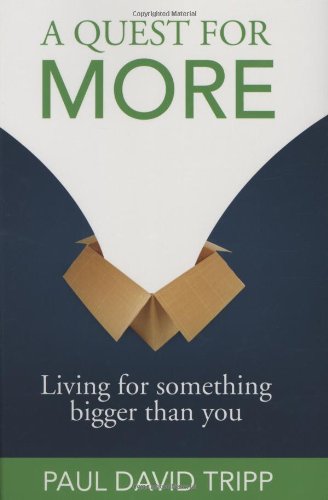I read this for church, which is a little weird to begin with (it's odd to hear sermons connected or organized based on anything other than the Good Book), and I found it so poorly written and edited that I really struggled with finding much of anything that was spiritually valuable. The basic premise is that Christians have gotten so accustomed to living in the day-to-day life of the world that we've lost sight of the larger Kingdom that we have been invited to be a part of. Tripp expresses this repeatedly by saying that we have shrunk "the size of our lives to the size of our lives", which doesn't work for me because it just seems like a nonsensical tautology. It finally occurred to me that the poor writing is, in part, due to the use of a rhetorical preaching style (which at times shifts into an almost colloquial, conversational style), so that the words on the page might actually communicate something meaningful if they were spoken aloud and accompanied by gestures and facial expressions.
As someone who cares about language, it is hard to take seriously a book like this, where it seems the author couldn't be bothered to write properly, or at least find an editor who could clean up the mess. There were a couple of times that I actually laughed out loud due to the poor editing, when the literal sense of the words was clearly not the intended sense. In the first chapter, Tripp goes on and on about transcendence without ever really, carefully defining what it means or what exactly he thinks it is that we should be transcending. Often, his points are heavily overstated and exaggerated; he'll use vignettes of a person or situation to make a point, but they are oversimplified caricatures that don't hold up under scrutiny, straw men he can take down. He presents what could be a really powerful, interesting metaphor-- that of jazz music as an idea of freedom and form-- and then wastes it. He talks about things like time signature and musical key that would apply to any kind of music, but he never draws out the lines of how exactly the music analogy works, so that when he states that Christians should not compose their own music but only play along with God's composition, it doesn't ring true to me, because I believe creativity is one of the ways we are made in God's image. Maybe it makes sense in the context of the author's understanding of the metaphor, but because he never clearly communicates it, it doesn't make sense to me. The author seems to be sloppy and lazy with this metaphor, and oversimplifies things, perhaps because otherwise it wouldn't work for what he wants to say.
Mostly what I got out of this book was by forcing myself to think through and articulate the things I read that bothered me, that didn't make sense, that seemed wrong. It was rather a frustrating experience, and not one I'd recommend.
| Title: | A Quest for More: Living for Something Bigger than You |
|---|---|
| Author: | Paul David Tripp |
| Date published: | 2007 |
| Genre: | Religion |
| Number of pages: | 210 |



0 comments:
Post a Comment